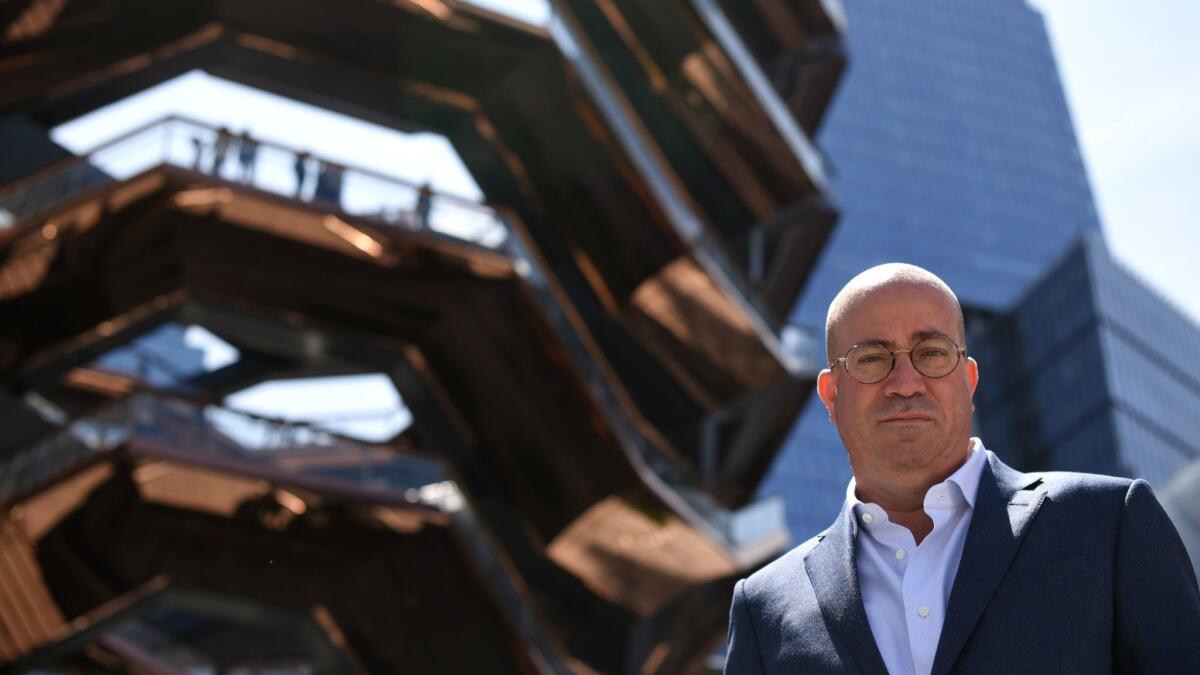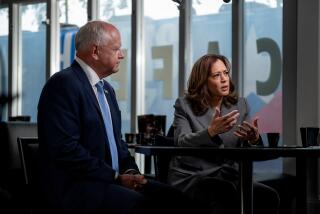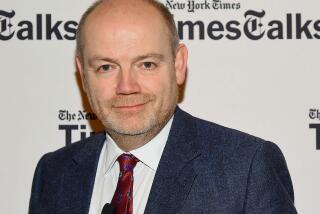CNN chief Jeff Zucker may be at war with Trump, but the new bosses at AT&T don’t mind

At the South by Southwest festival in March, CNN chief Jeff Zucker was presented with a question he’s been hearing since President Trump’s stunning White House win in 2016.
“Do you have any regrets about giving Donald Trump so much coverage during the election?” asked a college student, who described himself as an avid viewer of the news channel.
“OK, next question,” Zucker quipped. But after getting a laugh from a crowd gathered on the patio of an Austin, Texas, bar, the veteran news executive acknowledged that “we made some mistakes” when airing Trump rallies live and unedited during the campaign. But he maintains it was not the reason Trump won.
Zucker, 54, has faced far harsher criticism from the president, who riles his supporters by citing CNN when he riffs on the media being “the enemy of the people.” CNN anchors and reporters get visits from the FBI to deal with threats, and security around them has been stepped up.
Although Zucker has become a polarizing public figure in a hyper-partisan nation, he has pleased one important constituency — CNN’s new parent, AT&T. After six years of leading CNN to record profits, Zucker was rewarded with a new title of chairman of WarnerMedia News and Sports in March, making him the company’s maven of live TV. He will now guide CNN through a potentially epic 2020 presidential campaign while exploring ways to expand WarnerMedia’s portfolio of sports properties, which include the NBA and the NCAA Men’s Championship Basketball Tournament.
The job taps into Zucker’s passion for sports — he is a die-hard Miami Dolphins fan with vivid recall of the NFL team’s undefeated season in 1972. He dealt with sports rights negotiations during his run as president of NBCUniversal.
The elevated role is a relief to some CNN staffers who feared Zucker would leave the network after the AT&T deal. Trump has called for his firing, and some feared AT&T Chief Executive Randall Stephenson, who has a good relationship with the White House, would listen, or even spin off CNN. Right-wing commentators said definitively that Zucker would be out. There were reports Trump’s ire with CNN led to the Justice Department’s unsuccessful attempt to stop the $85-billion merger with Time Warner in the courts, a claim Justice Department officials have denied.
But Zucker told The Times in a recent interview in his empty office at Time Warner Center (the company has since moved to its new headquarters in Hudson Yards on Manhattan’s West Side) that AT&T has respected CNN’s journalistic independence. Last fall, AT&T donated $250,000 to the Committee to Protect Journalists, an organization that defends press freedom around the world.
The company was also completely on board when CNN went to court to reinstate the White House press credentials of correspondent Jim Acosta after Trump’s press office lifted them because it was unhappy with his aggressive questioning during briefings.
“I think that was an enormous test of how AT&T felt about the division,” Zucker said. “And I can tell you unequivocally from the start they were very supportive. It is not an easy thing to sue the president of the United States.”
It helps that under Zucker’s watch the network’s annual profits have doubled to $1.2 billion even as it lags behind rivals in the Nielsen ratings. Through the first five months of 2019, CNN had a daily average of 654,000 viewers — down 8% from a year ago, compared with 1.39 million for Fox News (down 3%) and 1.02 million for MSNBC (up 3%).
But about 70% of the network’s revenues come from carriage fees from cable and satellite operators, which continue to grow even as more consumers cut the cord. S&P Global Intelligence said CNN took in $974 million for its flagship channel in 2018, up nearly 7% from the previous year.
A pay TV subscription is still the only way to watch CNN live. That will not change, but Zucker said CNN could put its name on a separate direct-to-consumer streaming news service aimed at cord-cutters, as other TV news organizations have done, “within the next two years.”
CNN’s additional revenue from digital news content and its international channels have helped push annual profits to more than $1 billion in each of the last three years, and Zucker is expecting similar results in 2019.
CNN’s original series programs and films, which can draw ratings in slow breaking news periods and be sold to streaming services, have also become a lucrative business. Zucker believes ratings will rebound as the 2020 race for the White House heats up, although not the level they reached in 2017, when Trump turned cable networks into must-see TV.
Zucker has tried hard to keep CNN’s coverage in the middle lane as Fox News gets a lift from hosts and commentators who defend Trump and his policies (and regularly hammer Zucker, who has called their channel “state-run TV”), while MSNBC wins viewers with its deep dives into the administration’s troubles.
“We’re not pro-Trump and we’re not anti-Trump — we’re pro-truth,” he said. “And I understand that pro-truth in this day and age can come off as anti-Trump. But for us the chips will have to fall where they will.”
Zucker cites consumer research that CNN regularly commissions. In April, when respondents were asked to name a news organization they trust most for national and international coverage, 23% named CNN, putting it ahead of Fox News, which had 21%. Those numbers have been fairly consistent in recent years, even with Trump bashing the channel, he said.
Trump has loomed large in Zucker’s long career.
After graduating from Harvard with a degree in American history, Zucker rose quickly in the TV business. The son of a cardiologist and an English teacher, Zucker, who grew up in Miami, was hired by NBC Sports in 1986 to be a researcher for the 1988 Summer Olympics. By 1992, at age 26, he was the executive producer of NBC’s morning franchise “Today,” helping it become the most-watched morning program for 16 consecutive years.
NBC executives noticed the ultra-competitive Zucker’s skill at managing talent and his feel for audience tastes. They tapped him to run the network’s entertainment division in 2000, even though he had no experience in Hollywood. It was also a time the network’s hold on prime-time ratings leadership was slipping.
Looking for a turnaround, Zucker bought “The Apprentice,” a reality show in which aspiring business people competed for a yearlong position in one of Trump’s companies. After the series debuted in 2004, it turned Trump into a major TV star and gave Zucker his biggest hit (three years later Zucker was promoted to chief executive of NBCUniversal).
Zucker said Trump the TV star had many of the same characteristics he has shown as a politician.
“He was bombastic, he was bigger than life, he was his own PR agent, and he stretched the truth on the show’s ratings success,” Zucker said. “But he was an actor on a TV show, so it didn’t really matter. I think he was grateful for the opportunity I gave him, and I was grateful for the success that he brought us. And so it was a two-way street and it was a good relationship.”
Zucker believes Trump could not have become president without the popularity he gained from “The Apprentice.” But he rejects the role that some have ascribed to him for Trump’s political rise.
As he told the student in Austin back in March: “A lot of people are looking to explain why Donald Trump is president and they want to blame somebody because they are not happy about that. I think the media is an easy target. But there are a lot of other factors that went into why Donald Trump is president.”
Any good feelings Trump may have had toward Zucker disappeared once the campaign received tougher scrutiny from CNN.
“Trump measures relationships in terms of loyalty, whether that’s in politics, media or business. And if you don’t do what he wants, then he thinks you’re not friends anymore. He thinks everything is transactional. He thinks everything is a numbers game. It’s not.”
Zucker says he has not personally spoken to Trump in more than a year. But Trump has an open invitation to sit down for an interview on CNN, the only major journalism outlet he has not spoken to since becoming president.
(Trump has done dozens of interviews with Fox News, where his strongest media supporters, such as Sean Hannity, are based. But he has even lashed out at that outlet lately for devoting hourlong town hall telecasts to his potential Democratic rivals in the 2020 race.)
“It has not hurt us to not have Trump on, but we certainly would be happy to have him,” Zucker said. “Do I think he’ll do it? Listen, I think he’s afraid of being asked the tough questions.”
The White House did not respond to a request for comment.
Zucker’s combativeness has made him a popular figure among CNN employees, which long had a management culture that avoided public confrontations when attacked.
“He fights for us,” said Rick Davis, executive vice president of news standards and practices at CNN, who has worked at the company since it launched in 1980. “He makes us smarter. He’s funny. That’s so important when things get tense and he’s challenging people.”
Davis also appreciated a call Zucker made before arriving at the network. Davis had been diagnosed with colon cancer, and Zucker, who has survived the disease, offered advice and support and sent the largest fruit basket he has ever seen.
Longtime CNN anchor Anderson Cooper said Zucker’s crusade to protect the network is being noticed by viewers.
“I’ve always had people coming up and talking to me, but now there is a lot of, ‘Keep doing what you’re doing’ and even ‘I don’t agree with you, but I appreciate what you’re doing,” Cooper said. “There is a growing sense of the importance of journalism in democracy. I have that conversation multiple times a day now.”
After spending his years at NBCUniversal in a remote executive suite, Zucker made an effort to embed himself in the news operation at CNN. His office is adjacent to the newsroom and is the same size as the other spaces along the wall. He frequently sends hosts and correspondents texts when he is happy (“Gr8 Job”) or has a suggestion for improvement.
“He makes people feel good and makes them feel like he’s paying attention,” said Michael Glantz, a partner at talent agency ICM, who represents a number of anchors and correspondents at the network. “He knows that he’s earned a lot of respect over there, and he enjoys that.”
The one question that many CNN insiders have about Zucker is how long he will stick around. He would not comment on the length of his contract, which is believed to run through 2020.
Zucker has mused about pursuing political office in the past, and a recent comment by CNN anchor Don Lemon that his boss would make a good mayor of New York City sparked reports that he was considering a run in 2021.
Zucker has since received calls from what he called “concerned citizens” who offered financial backing for a campaign. So is he running?
“I’m not,” he said.
More to Read
Inside the business of entertainment
The Wide Shot brings you news, analysis and insights on everything from streaming wars to production — and what it all means for the future.
You may occasionally receive promotional content from the Los Angeles Times.











